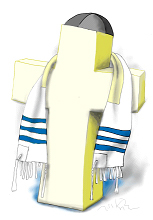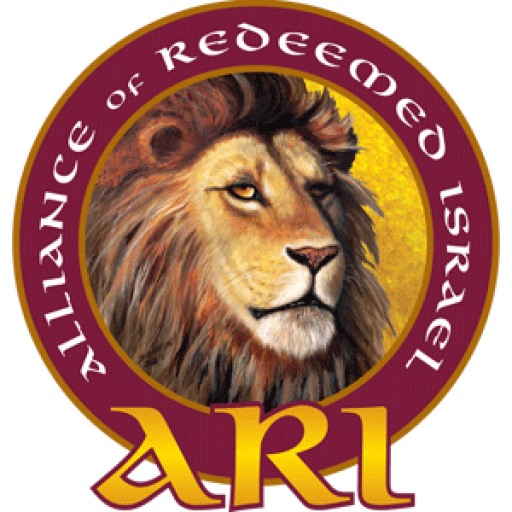The following article appeared in our Messianic Israel Herald Magazine,
Volume 3 Issue 1, Saint Cloud, FL.
It was Reproduced and used by paid permission from the Jerusalem Report Magazine.
The following article appeared in the Magazine, The Jerusalem Report, and was written for a Jewish audience; we [the MIA] are reprinting it here so that Believers in Messiah Yeshua might be made aware of the fact that a staggering number are denying that He is the Messiah, and are converting to Judaism. Unfortunately, in the many years since the article was written the problem of conversion to Judaism has not improved.
Copyright The Jerusalem Report
Issue: December 3, 2001, page 36.
Reprinted with permission.
by Ronda Robinson, Knoxville, Tennessee
 A funny thing often happens on the way to trying to convert Jews to Christianity: The Christians convert to Judaism
A funny thing often happens on the way to trying to convert Jews to Christianity: The Christians convert to Judaism
Joe Urso comes from a solid Christian background. His father’s family were practicing Catholics. His mother’s were Protestants. “We were exposed to both religions growing up, but didn’t practice either at home,” recalls the 41-year-old postal worker.
One Christmas Eve a few years ago, Urso was fighting traffic after a last-minute dash to the shopping mall here in Knoxville when he heard a Sabbatarian preacher on the radio talking about the holiday’s pagan roots. Then the speaker turned to the observance of Shabbat and basic elements of kashrut, reflecting the interest in Jewish ritual among Sabbatarians – Christians, such as Seventh Day
Adventists, who observe Saturday as the Sabbath because they take the laws of the Old Testament as truth. “It really triggered something in me that I wanted to investigate further,” says Urso.
So began a spiritual journey that saw Urso pass through the messianic movement and ultimately into mainstream Judaism.
He underwent a Conservative conversion one and a half years ago, and is now studying for an Orthodox conversion. He is Shabbat-observant, keeps kosher, lays tefillin every day, recites the morning, afternoon and evening prayers, and wears tzitzit and a yarmulke.
And his story is far from unique. Indeed, Joe Urso’s journey to Judaism reflects a little known but widespread phenomenon in the world of evangelism: After attending “messianic” congregations – where the membership is mostly gentile and the mission is to evangelize Jews – many Christians end up becoming Jewish.
“The more these fundamentalist churches try to evangelize Jews … the more parishioners are going to ultimately wind up in a legitimate synagogue,” says Tovia Singer, an Orthodox rabbi who heads Outreach Judaism, in Monsey, New York, an association dedicated to countering the efforts of Christian groups and cults who target Jews for conversion. “It’s very common. I’ve seen it all over the country, particularly in the South. It backfires on them.”
The 340 “messianic” congregations around the United States are “churches that are designed to mimic synagogues,” says Singer. They use the term “messianic Jew” as a selling point to state that they have not abandoned their Jewishness. But only 15 percent of their members are Jews who have accepted Jesus as the messiah, he says. Singer puts the total number of “Hebrew-Christians” in the U.S. at about 200,000. He claims much the same number of gentiles – people like Joe Urso – have ended up converting to Judaism, but says it’s hard to track what churches they’re leaving to embrace the tradition.
Urso recalls how that Sabbatarian preacher on the radio so piqued his interest that he found himself sitting in his car until the show had ended. As a Christian, he’d always heard that the dietary laws in the Torah were passé, and so the preacher had him asking himself, “If these things that I’d been taught weren’t true, what else had I been taught and accepted blindly?”
Soon after that he did what many opposite-direction converts have done: He found a church with a hint of a Jewish flavor. The Seventh Day Church of God met on Shabbat and observed some elements of kashrut and the Jewish holidays.
“It was still 100 percent Christian,” says Urso. “All the holidays had a subliminal message about Christianity, but still it exposed me to more of Torah.” For instance, on Passover the three matzot were said to represent the Trinity, and the afikoman, the resurrection of Christ.
Thirsting for a more Jewish experience, Urso then turned to a messianic congregation called Shomair Yisrael, or Keeper of Israel.
The pastor and his wife, born Jews, cloaked their Christian message in Jewish ritual.
“The first time I heard some of these things it spoke to me,” says Urso. “It awakened something in me that was ancient … It motivated me to start learning Hebrew. I wanted to read the Tanakh without a translation.”
He began teaching himself Hebrew and dove into textual studies. Like some others immersed in Jewish symbols through the messianic movement, he at first felt comfortable. An exotic new world had opened. “It introduced me to Judaism in a setting that I was more familiar with. If I had been plucked out of the pew at First Baptist Church and put in an Orthodox synagogue, it would have been totally foreign to me,” Urso explains.
Formerly married to a Missionary Baptist Church member, Urso says his decision to convert to Judaism played a part in their recent divorce. When he converted, relatives on his mother’s side of the family told him he would go straight to hell.
Another Knoxvillian who embraced Judaism had a similar experience. Rivka Elisheva,43 and single, didn’t want her English name used here because she still hasn’t told her parents about her conversion two years ago.
She says she is grateful for the teachings she received from messianic churches in her native Colorado and Tennessee where she also learned Hebrew songs, Israeli dancing and some Shabbat observance.
Now a member of Heska Amuna synagogue, a Conservative congregation, and a devoted Torah student, she says, “I thank God every day that he put me on that path, because I had to go in steps.”
Thom and Carollee Walton of Pennsylvania also veered toward a messianic congregation – they call it a Hebrew-Christian church – early on in their journey to Judaism. There, they say they found some troubling discrepancies in Christianity. “It bothered me that Jews kept the Sabbath on Saturday and Christians on Sunday,” explains Thom Walton, 48, adding that for a while he and Carollee, 50, kept both. Another thorn in their side was “replacement theology,” the teaching that Christians are now the chosen people because Jews rejected Jesus as the messiah, and therefore God rejected them. Declares Thom Walton: “It’s blasphemous.”
Eventually, they left the congregation, then lost their Christian friends and felt isolated in Gettysburg. So this year they moved to the state capital of Harrisburg, where they live in a heavily Jewish neighborhood, attend an Orthodox shul, and are studying for conversion. “I wouldn’t trade it for anything in the world, as hard as it is,” Thom Walton says. “I feel like I’ve finally come home. I’ve looked all my life for it, and I’ve finally found it.”
Relatives haven’t been so happy for them. Thom’s two grown sons think the couple is crazy, though Carollee’s adult son is becoming more tolerant and accepting. “He’s afraid of losing the little bit of family he has left,” she confides. “He really doesn’t like it still.”
The couple’s own siblings have not been supportive of their journey to Judaism. “It has really pushed us away from our brothers and sisters,” says Carollee with a note of regret. “Since I was brought up as a Christian, why would I consider something they see as ungodly?”
Among those who have taken the Waltons under their wing are Mark Powers and his family, who live a couple of blocks away in Harrisburg. National director of Jews for Judaism, Powers has worked for 15 years to alert the Jewish community to the threat of the well-funded missionary movement that operates through Jews for Jesus, and similar evangelical-backed groups. Like Tovia Singer, Powers stresses that his main objective is to retrieve Jews who have lost their way – whether under the influence of missionaries and cults or simply assimilation and apathy. Powers, too, runs into opposite-direction converts across the country. “It is common,” he says of messianic churches as the vehicle. “But they’re also coming from mainline churches.”
“People coming through the Hebrew-Christian movement are looking for a ‘Jewish’ experience,” Powers adds. “Where are they going to find something authentically Jewish – but in Judaism?”
From The Jerusalem Report. Reprinted with permission.
